“No pills, but bell peppers,” is a great idea proposed by general practitioner, Tamara de Weijer. It is getting a lot of media attention too. It is, however, not just bell peppers that can be found in stores as a ‘pill substitute’, but also Vitamin D-enriched mushrooms. This is the first fresh produce product that can prove a health claim to be true.
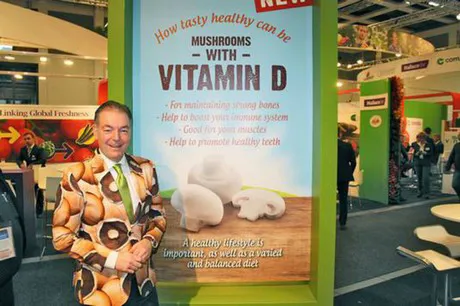
Rob Banken, the brother of Jurgen promotes the vitamin D mushrooms
It does not matter if it is raw or cooked - three mushrooms a day are sufficient to meet the Recommended Daily Allowance of Vitamin D. This is according to Jurgen Banken of Banken Champignons. This Dutch company is bringing this product onto the European market. Vitamin D mushrooms are already well-known in the United States and Australia. Thanks to Banken, these vitamin-enriched mushrooms have been in various European stores for two years now.
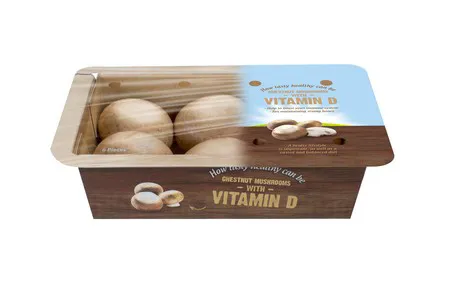
Much attention has been paid to the packaging
Looking back at their introduction, Jurgen says their reception varied. “Some retailers, such as those in Austria, walked away entirely. In Germany, Scandinavia, and the Netherlands, these mushrooms were enthusiastically received. They are not as popular in Southern European countries. There is more sunlight in those countries, so people are outdoors more. Vitamin D deficiency is, therefore, not so 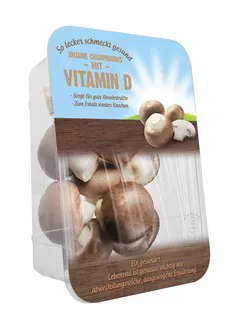 likely to occur there.”
likely to occur there.”
Banken needed the European Commission’s permission before they could bring these Vitamin D mushrooms onto the market. Its health claim had first to be scientifically proven, using the novel food procedure. This test was passed in 2017, paving this product’s way to supermarket shelves. “We then had to convince the retailers to make space on their shelves for these mushrooms,” says Jurgen.
“We also had to determine when and how to best place this product on the market. A summer introduction was, of course, illogical. The packaging was an important focal point too. Vitamin D mushrooms look exactly the same as regular mushrooms, so we had to develop distinctive packaging.”
A third important point was pricing. There are additional processes needed to produce these vitamin D mushrooms. These include lighting and separate harvesting and packaging. These extra expenses naturally make the product more expensive. A lighter weight packaging was chosen. This was done to ensure the price difference with regular mushrooms is not too high.
Marketing is the last step; now that these mushrooms are in the stores. How do you convince people to buy Vitamin D mushrooms instead of Vitamin D tablets?
Banken Champignons does not have a large-scale marketing campaign to draw consumers’ attention to this product. According to Jurgens, promoting these Vitamin D mushrooms is more in line with the supermarkets’ tasks. “As Banken Champignons, we are continually investing in product development. We do not have our own A-brand and its accompanying market budgets.”
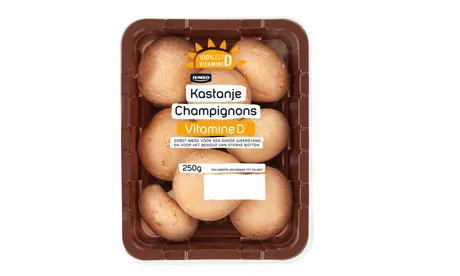
Retail packaging Vitamine D mushrooms at Jumbo Netherlands
“Retailers, however, have the means for this. Mushrooms are sold under private labels. There is, therefore, far more potential in a retail brand. Retailers can do targeted marketing. They can promote a fantastic product with all kinds of healthy substances to their customers in various ways - via their homepages and on the shelves. We can, of course, support them further in this,” explains Banken.
When it comes to new developments, there are several new products in the pipeline. “We are constantly researching to see what else we can do. Besides legumes, mushrooms are one of the few vegetables that contain protein. They can, therefore, fulfill an important role in the protein transition process toward a more plant-based diet. For example, some time ago, we introduced the mushroom burger. This product has since become fairly popular.”
“We will soon be launching a second product in this line. There are many possibilities as far as health benefits are concerned. Mushrooms can, for instance, provide additional Vitamin B12. Mushrooms are like sponges. They can easily absorb all kinds of nutrients via water. It takes a long time to bring these types of new products onto the market. We will first see how the Vitamin D mushrooms do before we bring another claim onto the market,” concludes Jurgen.
Vitamin D is one of the few vitamins humans can produce themselves, as long as their skin is exposed to enough sunlight. UV rays convert cholesterol in the skin into Vitamin D. A substance called ergosterol is found in mushrooms. Sunlight turns this into Vitamin D. Banken boosts this natural process using a special lighting system.
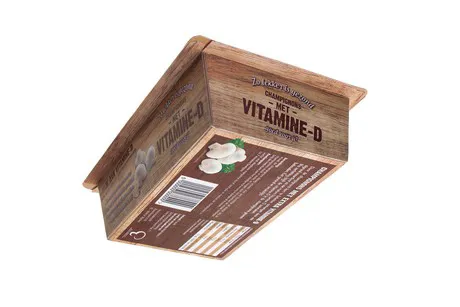 The bottom of the package has also been used to tell the story of the vitamin D mushroom
The bottom of the package has also been used to tell the story of the vitamin D mushroom
Scientific studies done in 2015 indicate that an estimated 60% of Dutch people have a (severe) Vitamin D shortage in the winter months. In the summer, this shortage is at 35% - still a decent size of the population.
The risk of a Vitamin D deficiency is greatest in the winter. The sunlight is then too weak to allow people to produce enough of this substance. People also spend less time outdoors and wear clothes that cover most of their skin. As you age, you also need more Vitamin D. The Dutch Health Council, therefore, advises the elderly to take extra Vitamin D every day, winter and summer. Other groups are at risk too. Young people spend less time outdoors nowadays. People wear clothes that cover their entire bodies due to religious reasons. Pregnant women, dark-skinned people, vegetarians, and vegans. People that consume high amounts of alcohol and those who are on fat-free of low-fat diets. These are all risk groups and need to take Vitamin D supplements.
